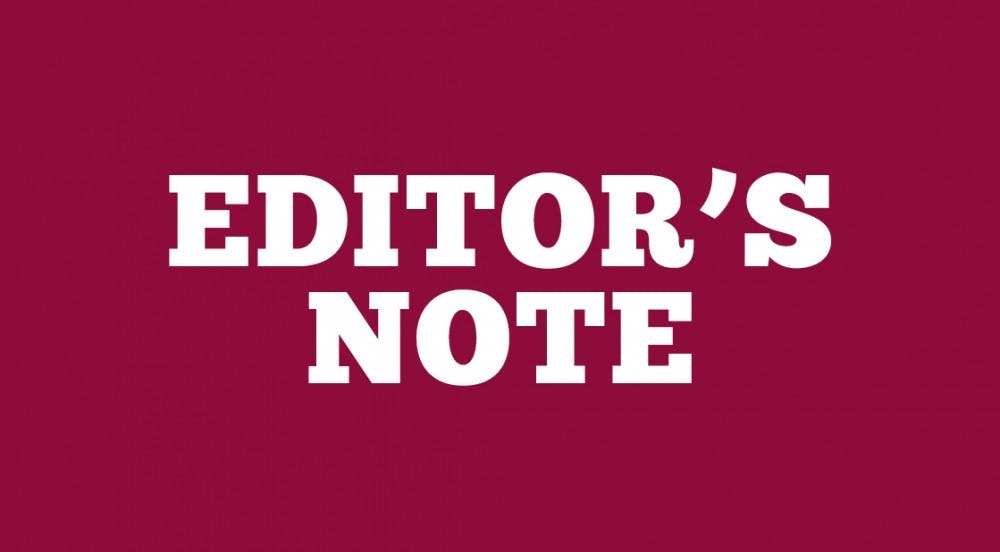OPINION: News outlets should be cautious when using anonymous sources
On March 23, News Central 34 released a broadcast that claimed to feature an exclusive interview with a student who said he saw sexually explicit images on a faculty member’s computer during a class in Moore Hall.
The student was not identified, and instead was presented on camera in shadow and had his voice modified to be unrecognizable.
The professor was not explicitly named, though references were made to an ongoing police investigation that we became aware of on March 10. Officers executed a search warrant in recently-resigned journalism and broadcast and cinematic arts professor Mark Ranzenberger’s office as part of a criminal investigation of child pornography found on the university-owned computer. The university placed him on a paid leave of absence effective March 14, though CMU spokespersons declined to say whether it was connected to the police investigation.
In the weeks following this broadcast, I have participated in several discussions with colleagues, faculty members in the Department of Journalism and News Central 34 adviser Richard Sykes about the ethics of using anonymous sources and how student media should report on the police investigation of a computer in Moore Hall and the now-ceased Faculty Personnel Services investigation of Ranzenberger.
In the pursuit of transparency and understanding, here are some thoughts on the subject.
Anonymous sources have a prominent history in the public’s perception of journalism. None are more famous than “Deep Throat,” the FBI source who helped The Washington Post report on the Watergate cover-up.
Anonymous sources are almost always a detriment to the straightforward, believable journalism our audience demands.
We strive never to publish information, and especially opinions, that are unattributed. The biggest reason story drafts are returned to be improved is because the copy editor had to ask “says who?”
The Society of Professional Journalists’ Code of Ethics — Central Michigan Life’s guiding document in answering ethical questions — contains two pointed statements on using anonymous sources.
The first — identify sources whenever feasible — is done because the public is entitled to as much information as possible on sources’ reliability. There is always a question of credibility that arises when information is attributed to an unnamed person, because they are given a space to speak publicly while also being protected from their statements.
If the only way to publish a story is to use anonymous sources — which is rarely the case — the reporter owes it to the readers to identify the source as clearly as possible without pointing a finger at the person who has been granted anonymity. We also don’t use pseudonyms to replace the real name of anonymous sources.
Even “Deep Throat” was not solely relied on, and reporters verified information provided before publishing.
Sykes was very clear when we discussed this point: The student interviewed by News Central 34 was confirmed by at least two other sources as a CMU student and a member of Ranzenberger’s class. Their reporters attempted to reach out to other students in the class, but none were willing to speak on the record.
Central Michigan Life also sent a reporter to the find students in this class, but we were unable to verify information provided by a source. In criticism of News Central 34’s piece, I believe not enough was done to show the audience that other sources confirmed what was said, even if it had happened behind the scenes.
The code of ethics also tells us to always question sources’ motives before promising anonymity. Sykes assured me that when the student approached News Central 34 and asked to not be identified, great lengths were taken to ensure he had no agenda. During the interview, Sykes said members of the staff intently watched the student to look for hints that he might be lying, and the staff had a collective conversation afterward about what was said.
In our coverage, anonymous or unnamed sources cannot make pejorative comments about the character, reputation or personal qualities of another individual, or derogatory statements about an institution.
In the broadcast, I was troubled when I heard the student criticize the university for allowing Ranzenberger to be “paid to not work” while on leave. He also said despite the investigation Ranzenberger was a “wonderful teacher” and “wonderful at what he does,” which Sykes said was deliberately broadcast to show that the student had no vendetta against his professor.
Anything published has the potential to follow the subject of a story for the rest of their life. Particularly in this case, accuracy and specificity is extremely important.
During my four years at Central Michigan Life, I cannot recall any instances of using anonymous sources. Sykes said in his 20 years at CMU, News Central 34 has “less times than I could count on one hand.”
We will not break from our tradition.
Allowing information to be released without holding the speaker accountable is a dangerous practice.







